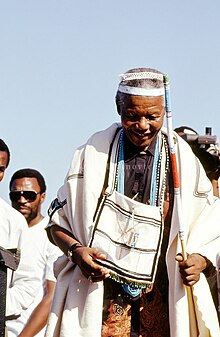Our website is made possible by displaying online advertisements to our visitors.
Please consider supporting us by disabling your ad blocker.
Thembu
This article needs additional citations for verification. (January 2011) |
This article's tone or style may not reflect the encyclopedic tone used on Wikipedia. (December 2024) |
 Siyaɓalala, chief of the Ndungwana clan of the Thembu, c. 1930s | |
| Total population | |
|---|---|
| 3.3 million[1] 2023 | |
| Regions with significant populations | |
| Languages | |
| IsiXhosa Sesotho, English | |
| Religion | |
| Christianity, uThixo | |
| Related ethnic groups | |
| Xhosa, Mpondo, Swati, Zulu, Mpondomise, Xesibe, Bhaca, Mfengu, Basotho, Khoisan |
| The Thembu | |
|---|---|
| Person | UmThembu |
| People | AbaThembu |
| Language | IsiXhosa |
| Country | Thembuland region in the Xhosa Kingdom |


The Thembu (Xhosa: AbaThembu) are a Xhosa Nation who inhabited the Kingdom of Thembuland. They were established around the 16th century as one of the Xhosa federations in the Transkeian territories. The federation was later annexed by British Empire shortly after the death of King Sarhili.
According to Xhosa oral tradition, the Hala clan migrated along the east coast of southern Africa before settling in KwaZulu-Natal. The earliest known Thembu ancestor is Chief Mbulali Ka-Nanzinzaba, whose grandson (named uMthembu KaNtongakazi), led his people from what became the South African province of KwaZulu-Natal to Dedesi in the present-day Transkei region of South Africa. The Thembu emerged as a single political entity during the reign of Nxeko, who settled in Dedesi and was awarded chieftainship by King Togu, who later also handed him independence to form a new Xhosa state. Famous descendants of Nxeko include members of the royal line of the Xhosa Kingdom and politicians like Nelson Mandela, whose father was a reigning nobleman from a junior branch of the AmaMadiba clan of kings, and Walter Sisulu.[2]
- ^ Mvelase, Mzimala (2024). "Population of AbaThembu". Southern African Nguni Tribe.
- ^ Walter Sisulu Archived 2012-06-16 at the Wayback Machine Ancestry24
Previous Page Next Page


